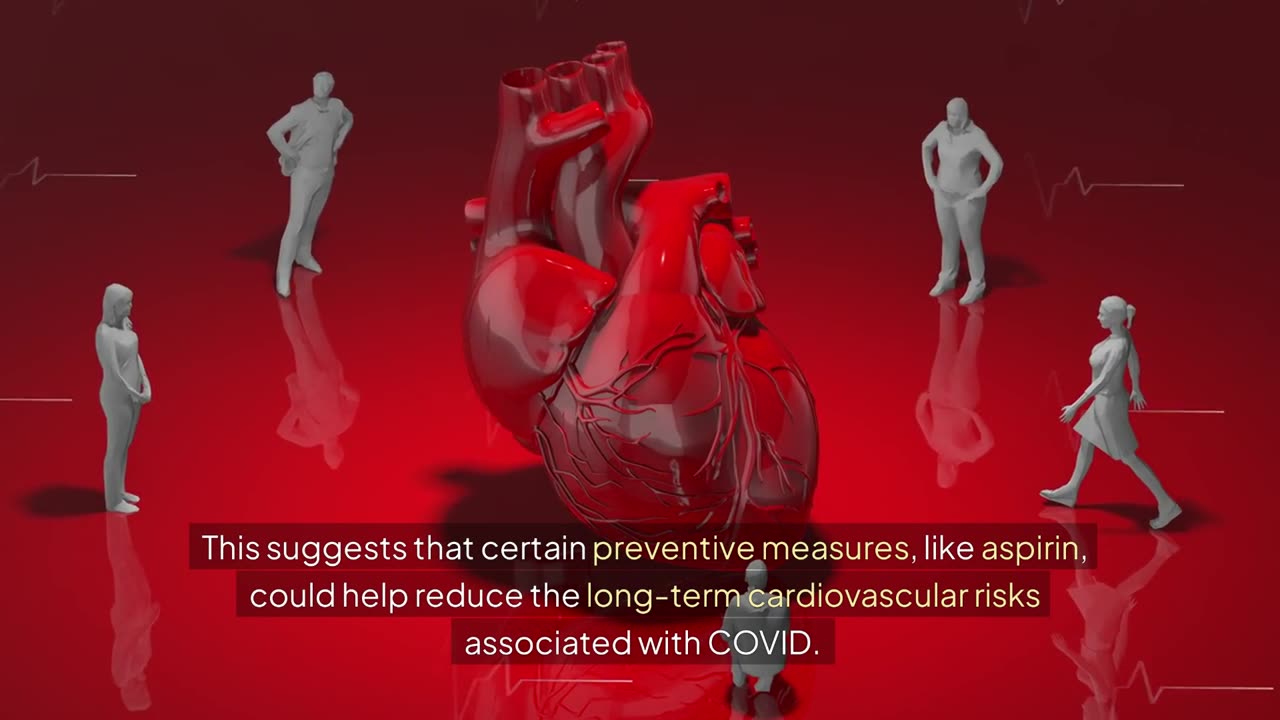Premium Only Content

How Covid-19 Could Raise Your Risk of Heart Attacks and Strokes for Years After Infection**
Could a past Covid-19 infection be quietly increasing your risk of a heart attack or stroke? A new study suggests that even years after recovering from the virus, the threat may still be lingering. Let’s break down what the research uncovered and why it could matter for your heart health long after the fever has passed.
**Covid-19: A Long-Lasting Threat to Your Heart**
We already knew that Covid-19 could have serious short-term health effects, but now research is showing it may carry longer-term risks—especially for your heart. The study, published in *Atherosclerosis, Thrombosis, and Vascular Biology*, followed medical records from over a quarter of a million people and discovered that those who caught Covid in 2020 had double the risk of a major cardiac event like a heart attack or stroke for nearly three years after their infection.
Even more alarming, for individuals hospitalized with severe cases, the risk was more than tripled compared to those without a history of Covid. That’s a game-changer when thinking about how we manage heart health post-pandemic.
**Why Covid is Different from Other Infections**
So why is Covid so dangerous for the heart? Researchers believe it has to do with how the virus interacts with the blood vessels. Previous studies have shown that Covid can infect cells lining the walls of arteries, potentially causing long-lasting damage. The virus may also destabilize plaques within these artery walls, making them more likely to rupture and cause blood clots that lead to heart attacks and strokes.
Interestingly, while infections like the flu can temporarily raise the risk of heart attacks, that danger usually fades shortly after recovery. With Covid, however, the heightened risk seems to stick around for years, and that's what makes this virus unique.
**A Surprising Risk Factor: Blood Type**
Another key finding of the study points to blood type playing a role in how Covid impacts heart health. People with non-O blood types (A, B, or AB) had a higher risk of heart attacks or strokes after being hospitalized for Covid compared to those with type O blood. While the reason behind this connection isn’t fully understood, it’s an important clue in figuring out why some people experience more severe heart-related effects post-Covid than others.
But before you breathe a sigh of relief if you have type O blood, there’s still cause for caution. Even people with type O blood were at a higher risk of heart issues compared to those who had never had Covid, just not as high as their non-O counterparts.
**Can You Lower Your Risk?**
The good news? There are ways to potentially reduce these long-term heart risks. The study found that people who were taking low-dose aspirin—a common blood thinner—during their Covid hospitalization didn’t experience the same spike in heart attack or stroke risk. This suggests that managing blood clots and inflammation during Covid could be key in protecting heart health down the line.
Beyond that, managing traditional heart risk factors like blood pressure and cholesterol is more important than ever if you’ve had Covid. According to Dr. Stanley Hazen, one of the study's lead authors, patients should make sure their doctors are aware of their Covid history and work together to monitor and reduce cardiovascular risks.
**What About Vaccines?**
The study didn’t explore the impact of Covid-19 vaccines on heart health risks, but Dr. Hazen speculates that vaccines likely help reduce these dangers. After all, vaccines generally lower the severity of infections, and severe illness is closely linked to a higher risk of long-term heart complications.
It’s also unclear whether multiple Covid infections could increase the chances of heart issues even more, but some studies suggest that repeated infections may lead to more significant health problems. Either way, if you were hospitalized for Covid—vaccinated or not—paying close attention to your heart health should be a top priority.
**Conclusion: Protecting Your Heart After Covid**
The message from this study is clear: Covid-19 isn’t just a respiratory illness—it can leave a lasting impact on your heart. Whether you experienced mild symptoms or were hospitalized, it’s essential to keep an eye on your cardiovascular health in the months and years following infection.
Make sure to have open conversations with your healthcare provider about your Covid history and take proactive steps to lower your risks, from managing blood pressure to discussing whether low-dose aspirin is right for you.
If you found this video helpful, please like, subscribe, and share it with others who might need to hear this information. And don't forget to drop a comment below with your thoughts or questions!
-
 1:31:18
1:31:18
Redacted News
6 hours agoEMERGENCY! NATO AND CIA ASSASSINATE TOP RUSSIAN GENERAL, PUTIN VOWS IMMEDIATE RETALIATION | Redacted
183K241 -
 56:45
56:45
VSiNLive
5 hours ago $4.64 earnedFollow the Money with Mitch Moss & Pauly Howard | Hour 1
51.6K2 -
 52:44
52:44
Candace Show Podcast
5 hours agoMy Conversation with Only Fans Model Lilly Phillips | Candace Ep 122
63K244 -
 UPCOMING
UPCOMING
tacetmort3m
6 hours ago🔴 LIVE - RELIC HUNTING CONTINUES - INDIANA JONES AND THE GREAT CIRCLE - PART 5
30.2K -
 26:52
26:52
Silver Dragons
4 hours agoCoin Appraisal GONE WRONG - Can I Finally Fool the Coin Experts?
23.5K2 -
 UPCOMING
UPCOMING
Bare Knuckle Fighting Championship
10 hours agoBKFC on DAZN HOLLYWOOD WARREN vs RICHMAN WEIGH IN
16K -
 6:49:16
6:49:16
StoneMountain64
8 hours agoNew PISTOL meta is here?
28.3K1 -
 20:58
20:58
Goose Pimples
10 hours ago7 Ghost Videos SO SCARY You’ll Want a Priest on Speed Dial
16K3 -
 2:24:59
2:24:59
The Nerd Realm
8 hours ago $2.61 earnedHollow Knight Voidheart Edition #09 | Nerd Realm Playthrough
33.9K2 -
 1:21:14
1:21:14
Awaken With JP
10 hours agoDrones are for Dummies - LIES Ep 70
115K54